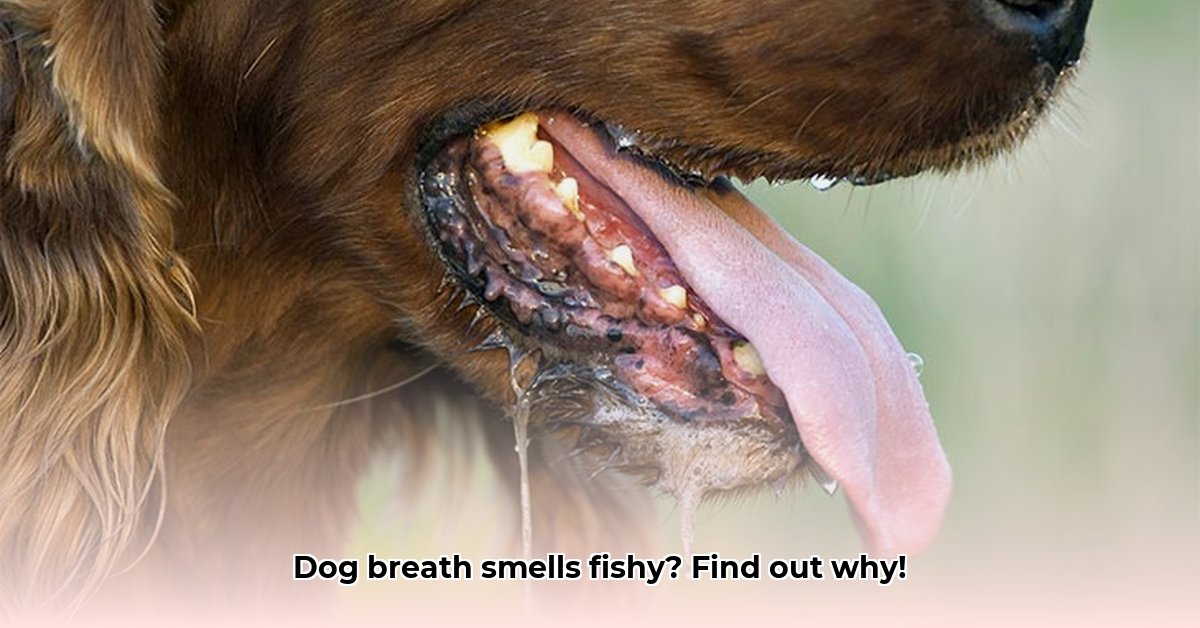Ever notice your dog’s breath smells a bit… fishy? Don’t worry, you’re not alone! While a slight fishy scent after a tasty treat is normal, consistently fishy breath could mean something’s up with your furry friend. It’s not just about bad breath; it can actually point to some underlying health problems. This guide will help you understand why your dog’s breath smells like fish, what might be causing it (from simple dental issues to more serious conditions), and most importantly, what you can do about it. We’ll walk you through easy-to-follow steps for better home care, and when you need to see the vet. For more on canine health concerns, check out this article on dog nighttime panting. Let’s get that fishy smell under control and keep your dog happy and healthy!
Unmasking the Mystery: Why Your Dog’s Breath Smells Like Fish and What To Do About It
That fishy smell coming from your dog’s mouth? It might not be as simple as a sneaky stolen sardine. While a temporary fishy scent after a treat is usually nothing to worry about, a persistent, strong fishy smell in your dog’s breath could be a sign of an underlying health issue that needs your attention. How to differentiate fishy dog breath causes based on smell intensity is key to determining next steps. Ignoring it could mean missing out on early treatment for potentially serious health problems. Let’s dive in and figure out what’s going on with your dog and their oral health.
The Usual Suspects: Dental Disease, Diet, and Their Impact on Breath
Believe it or not, the most common reason for that fishy breath is often poor dental hygiene. Think of it like this: plaque and tartar build up on your dog’s teeth just like they do on ours. This buildup creates a perfect breeding ground for bacteria, and these bacteria produce volatile sulfur compounds that smell unpleasant – sometimes smelling strongly of fish. The severity of the smell usually corresponds to how much tartar and plaque have accumulated; a slightly fishy smell might indicate mild buildup, while a really strong, persistent fishy odor suggests more serious dental disease like periodontal disease or gingivitis.
What your dog eats also matters significantly. If you’ve recently given your furry friend a fishy treat, that could be the culprit, but the smell should dissipate. However, regularly feeding your dog fish-based food or treats could worsen any existing dental problems, making the fishy breath even more noticeable. Also, some dogs have a habit of eating things they shouldn’t, like garbage or even feces, which can definitely lead to a fishy or otherwise foul odor.
Beyond the Teeth: Systemic Issues That Can Affect Your Dog’s Breath
Sometimes, that fishy smell isn’t just about the mouth. It can be a hint that something’s amiss elsewhere in your dog’s body. Conditions like kidney disease, liver problems, or even diabetes can sometimes cause a fishy smell on the breath.
- Kidney Disease: When the kidneys aren’t functioning properly, they can’t filter toxins from the blood effectively. These toxins can build up and be detected on the breath.
- Liver Problems: Similarly, liver disease can lead to a buildup of toxins in the body, which can also manifest as bad breath.
- Diabetes: In some cases, diabetes can cause a sweet or fruity smell on the breath, but sometimes it can present as a fishy odor.
These are more serious issues that need immediate veterinary attention. The key here is to pay attention to the intensity and how long the fishy smell lasts – a consistently strong, fishy smell is more likely to indicate one of these serious medical problems than a mild, occasional smell.
Getting Answers: The Importance of a Vet Visit and Health Assessment
If you’re concerned, it’s always best to schedule a visit with your veterinarian. They’ll conduct a thorough examination, checking your dog’s teeth and gums carefully for any signs of infection, gum disease, or tumors. They might also recommend blood tests to assess your dog’s kidney and liver function, and to check blood sugar levels (to rule out diabetes). A complete blood count (CBC) can also help identify underlying infections. Depending on what they find, they may also suggest further tests, like X-rays, to get a more complete picture of what might be happening. Early detection of any underlying health issue significantly improves the chances of successful treatment.
Taking Charge: Home Care and Prevention Strategies for Fresh Breath
Preventing problems—or catching them early—is key to keeping your dog happy and healthy. Here’s how you can proactively maintain your dog’s oral health:
- Brush Those Chompers: Daily brushing is essential! Use a dog-specific toothpaste (never human toothpaste, as it contains fluoride which is toxic to dogs). There are many flavors available, and finding one your pup enjoys makes the task easier. Look for a soft-bristled toothbrush designed for dogs to avoid irritating their gums. Finger brushes can also be a good option for dogs who are resistant to traditional toothbrushes.
- Dental Chews – A Helpful Addition: Veterinary Oral Health Council (VOHC)-approved dental chews can help to scrape away plaque and tartar buildup between brushings. These aren’t a replacement for brushing, however; they’re a helpful addition to your dog’s dental care routine.
- Dietary Considerations: High-quality dog food is crucial for overall health, including oral health. Dry kibble is generally better for dental health than wet food, as it helps to scrape the teeth. If your dog has persistent fishy breath, your vet might suggest adjusting their diet, potentially avoiding foods with a strong fishy flavor. A veterinary nutritionist can provide personalized recommendations. Consider adding a probiotic supplement to your dog’s diet to support a healthy gut microbiome, which can also contribute to better breath.
- Water Additives: Some water additives can help to reduce plaque and tartar buildup. Look for products that contain ingredients like chlorhexidine or zinc.
- Regular Checkups Are Your Friend: Schedule regular checkups with your vet, including professional dental cleanings. This proactive approach allows for early detection of any potential problems, allowing for quicker and more effective interventions. Your vet can perform a thorough dental cleaning under anesthesia to remove plaque and tartar buildup that you can’t remove at home.
Breed and Age – Factors to Consider in Your Dog’s Oral Health
Some dog breeds are simply more prone to dental problems than others. Small breeds, like Chihuahuas and Yorkshire Terriers, are particularly susceptible to dental disease due to their small mouths and crowded teeth. Brachycephalic breeds (those with short noses), like Bulldogs and Pugs, can also have dental issues due to their jaw conformation. And, as with people, older dogs are at a higher risk of developing kidney and liver diseases. So, if your dog is a breed known for dental issues or is a senior dog, be extra vigilant about monitoring their breath and scheduling regular vet visits.
Putting It All Together: Prioritizing Your Dog’s Health
While a slightly fishy smell on your dog’s breath occasionally isn’t always a major cause for alarm, a persistent, strong fishy odor should always be checked out by your veterinarian. Taking proactive steps like regular brushing, using appropriate dental chews, and maintaining a healthy diet will greatly reduce your dog’s risk of developing dental problems and other health issues. Early detection remains the key to effective treatment and a happy, healthy dog. Remember, your dog’s overall well-being depends on your attention and proactive care. Don’t hesitate to contact your veterinarian if you have any concerns.
Deciphering the Odor: How to Differentiate Fishy Dog Breath Causes Based on Smell Intensity for Early Detection
Key Takeaways:
- Fishy breath in dogs often points to underlying health problems, not just diet.
- The intensity and persistence of the odor provide clues about the underlying issue.
- Regular vet checkups are crucial for early detection and prevention.
- Good oral hygiene at home significantly reduces the risk of fishy breath.
Understanding the Smell: Paying Attention to Intensity and Persistence
That fishy odor on your dog’s breath? It’s not always what you think. Sometimes, it’s a simple case of dietary indiscretion – they got into the cat food again. But often, a lingering, strong fishy smell hints at something more serious. How to differentiate fishy dog breath causes based on smell intensity is key to determining next steps. A mild, temporary fishy scent after eating fish-flavored treats is different from a persistent, strong odor that lingers for days.
Common Causes: From Dental Problems to Internal Organ Involvement
Let’s break down the potential culprits:
- Dental Disease: This is the most common cause. Plaque and tartar buildup create a breeding ground for bacteria, resulting in a foul odor that can range from slightly fishy to overwhelmingly pungent. The intensity often correlates with the severity of the dental issues, from mild gingivitis to severe periodontal disease with tooth loss.
- Dietary Factors: A temporary fishy smell may simply be from eating fish or fish-flavored food. This is usually mild and fades quickly. However, scavenging fish or other questionable things, like garbage or carrion, can create a more persistent and offensive odor.
- Systemic Diseases: Kidney or liver disease can cause a strong and persistent fishy smell. This is often accompanied by other symptoms like increased thirst, urination changes, lethargy, vomiting, or loss of appetite. The intensity may fluctuate depending on disease progression.
- Anal Gland Issues: Impact
- Stainless Steel Food Storage for Healthier, Eco-Friendly Meal Prep - February 27, 2026
- Stainless Food Containers Offer Durable Storage for Everyday Meals - February 26, 2026
- Stainless Steel Containers Offer Superior Food Preservation and Durability - February 25, 2026










